Truthdigger of the Week: Daniel Ellsberg
Pentagon whistle-blower Daniel Ellsberg remains a steadfast example of the courage he recognizes in Edward Snowden and others in the current generation of whistle-blowers.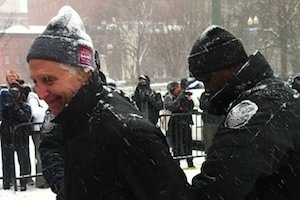
Every week the Truthdig editorial staff selects a Truthdigger of the Week, a group or person worthy of recognition for speaking truth to power, breaking the story or blowing the whistle. It is not a lifetime achievement award. Rather, we’re looking for newsmakers whose actions in a given week are worth celebrating. Nominate our next Truthdigger here.
I first met Daniel Ellsberg, the former military analyst who helped end the war in Vietnam by leaking the Pentagon’s secret history of U.S. involvement in that country, in December 2010. It was a cold day in Washington, and just over 130 of us — war veterans, activists, journalists and other concerned people — had pinned ourselves against the exterior of the White House fence. We were there to protest the wars in the Middle East started by President Bush and continued under President Obama. We intended to get arrested.
I was inappropriately dressed for the occasion. I had heard from veteran activists that it looked good in the media if the police were seen handcuffing people in formal clothes. I lacked a suitable heavy coat, so I dressed in layers and threw on my dark sport jacket, figuring that I could put up with the cold in the relatively quick time it would take for the D.C. Park Police to lead us away. This was a miscalculation. The last of us to go had spent at least four hours cursing the warfare state in the cold. I spent the morning and afternoon shivering.
My suffering did not go unnoticed. The expressions and tones of those nearby, mostly all kind, told me I had made a rookie mistake. My youth and inexperience were showing, despite my best efforts to conceal them. Very well, I thought, standing and smiling, and when not being friendly with a neighbor, occasionally looking toward the ground.
It must have been during one of these lengthy contemplations of other people’s boots and the settled snow that a familiar voice, not far off, drifted into my ear. When I looked up, Daniel Ellsberg was standing directly in front of me. “You’re going to catch a cold,” he said, between a knit hat and a pair of dark collars turned up to protect him from the wind. He spoke with the softness of an elder statesman, and with two gloved hands gently took both ends of my loose scarf and wrapped them around my neck. “Thank you, Mr. Ellsberg,” I said.
A few minutes later a member of the Park Police motioned for Ellsberg to step away from the line. Grinning, he went. The cops had placed a barricade around the scene and a large crowd had gathered to watch. People on both sides cheered as the arrest took place. A cop zip-tied Ellsberg’s hands behind his back, and after a few moments, quietly marched him toward the row of police vans that were waiting on the other side of Pennsylvania Avenue. I remember his large pink hands against the dark of his jacket as he walked through the snow. They had taken the shape of peace signs.
On June 9, 29-year-old former Booz Allen Hamilton employee Edward Snowden revealed himself to be the source of leaks to The Guardian and Washington Post newspapers detailing the National Security Agency’s secret and expansive data collection and surveillance programs. The leaks confirm in unprecedented specificity the digital spying programs that the public has gotten mere glimpses of over the last decade. He disclosed the documents to inform people of the existence of infrastructure that could enable the transformation of America into a full-blown surveillance state.
In a note accompanying the first set of documents he provided to The Guardian, Snowden wrote: “I understand that I will be made to suffer for my actions,” but “I will be satisfied if the federation of secret law, unequal pardon and irresistible executive powers that rule the world that I love are revealed even for an instant.”
During the identification interview he gave to The Guardian from a hotel room in Hong Kong, Snowden described his motivation for leaking the material. “I really want the focus to be on these documents and the debate which I hope this will trigger among citizens around the globe about what kind of world we want to live in,” he said. “My sole motive is to inform the public as to that which is done in their name and that which is done against them.”
“I’m neither traitor nor hero,” he added later in an interview with the South China Morning Post. “I’m an American.”
Ellsberg too was disturbed by the direction in which his government was taking his country. His opposition to the war was cemented during a speech he heard at an anti-war rally in Haverford, Pa., in the summer of 1969, while still an employee of defense consulting firm RAND Corp. Protester Randy Kehler had told an assembled crowd that he was “very excited” that he was going to join fellow war resisters in prison.
“There was no question in my mind that my government was involved in an unjust war that was going to continue and get larger,” Ellsberg said of his reaction to the speech, as reported by Marlo Thomas in her book “The Right Words at the Right Time.” “Thousands of young men were dying each year. I left the auditorium and found a deserted men’s room. I sat on the floor and cried for over an hour, just sobbing. The only time in my life I’ve reacted to something like that.”
In the middle of June 1971, The New York Times began publishing reports about the Pentagon Papers supplied to it by Ellsberg. Though the paper did not reveal him as its source, Ellsberg went into hiding for 13 days, suspecting the evidence would peg him as responsible for the leak.
On June 28, Ellsberg publicly surrendered to the U.S. Attorney’s Office for the District of Massachusetts in Boston. At that time he said: “I felt that as an American citizen, as a responsible citizen, I could no longer cooperate in concealing this information from the American public. I did this clearly at my own jeopardy and I am prepared to answer to all the consequences of this decision.”
The Nixon administration promptly started a campaign to discredit and prosecute him. Agents of the president who would later be indicted in the Watergate scandal broke into Ellsberg’s psychiatrist’s office to look for information they could use to cast doubt on his mental health. In January 1973 a trial began to consider Ellsberg’s alleged treason under the 1917 Espionage Act. When the Nixon burglary was revealed, the trial fell apart. The case was pronounced unprosecutable, Ellsberg was cleared of all charges of wrongdoing, and two years later the Vietnam War was over.It is difficult to believe things will go the same for Snowden. Our decade sees the president select and order the death of people in other countries with impunity. The Obama administration has prosecuted more whistle-blowers under the Espionage Act than all previous administrations combined. Pfc. Bradley Manning is on trial for providing classified documents to WikiLeaks and looks likely to receive a sentence of life in prison. WikiLeaks founder Julian Assange, who isn’t even an American citizen, is being pursued by the U.S. government for posting state secrets — but no established news organ that co-published the documents he collected, including The New York Times and The Guardian, is facing prosecution. This may be the worst time in American history to be a person of conscience employed in the machinery of government.
The documents leaked by Snowden stand as another exhibit in the mounting case against the legitimacy of the current government and its policies. Snowden now has a higher approval rating than both President Obama and Congress. A Time magazine poll found that 54 percent of Americans believed Snowden did “a good thing” and only 30 percent thought otherwise. Officials say that Snowden has endangered national security, but no hard evidence has been presented to prove this is true. Obama’s administration persistently fails to support such claims.
And like previous administrations, it spreads fabrications outright. When Oregon Democratic Rep. Ron Wyden asked National Director of Intelligence James Clapper in an open Senate hearing in March whether “the NSA collects any type of data at all on millions or hundreds of millions of Americans,” Clapper responded, “No, sir … not wittingly.”
Pundits and lawyers claim we need to carefully parse those words. But as Paul Campos at Salon wrote, “This is what an ordinary person would call a ‘lie.’ “
Long after the dust kicked up in the dispute over the Pentagon Papers settled, an editor at The New York Times said the documents “demonstrated, among other things, that the Johnson Administration had systematically lied, not only to the public but also to Congress, about a subject of transcendent national interest and significance.”
It remains to be seen whether that kind of respect for and adherence to the truth is even possible for members of the establishment in our age, when politicians, economists and journalists treat truth as chronically obscured or not more than a matter of personal and variable opinion. It appears to be up to the public to demand a return to honesty by taking either to the polling booth or the street.
Writing in The Guardian on June 10, Ellsberg said that Snowden had given us the most “important leak” in “American history” and “the possibility to roll back a key part of what has amounted to an ‘executive coup’ against the US constitution.” Referring to the secret police of East Germany, he wrote that Snowden had revealed “that the so-called intelligence community has become the United Stasi of America,” a symptom of America’s plummet into a dangerous “abyss” of totalitarianism.
“But with Snowden having put his life on the line to get this information out, quite possibly inspiring others with similar knowledge, conscience and patriotism to show comparable civil courage — in the public, in Congress, in the executive branch itself,” Ellsberg continued, “I see the unexpected possibility of a way up and out of the abyss.”
Just as he was 40 years ago, Ellsberg is committed to true liberty and truth. Americans need his message of moral clarity, and so does Edward Snowden, Bradley Manning and Julian Assange, as well as any other principled people who in the future may risk their lives to reveal dangerous secrets held by the U.S. government. For giving comfort to us all by remaining a steadfast example of the courage he recognizes in Snowden and others in the current generation of whistle-blowers, and for giving them the support of his good name, we honor Daniel Ellsberg as our Truthdigger of the Week.
Your support matters…Independent journalism is under threat and overshadowed by heavily funded mainstream media.
You can help level the playing field. Become a member.
Your tax-deductible contribution keeps us digging beneath the headlines to give you thought-provoking, investigative reporting and analysis that unearths what's really happening- without compromise.
Give today to support our courageous, independent journalists.
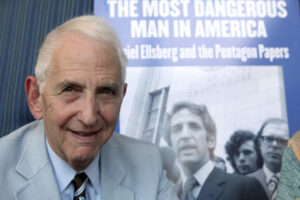

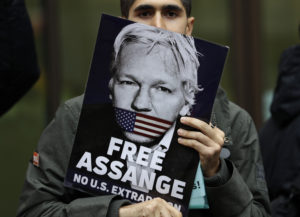
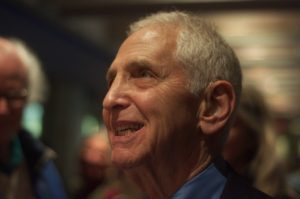
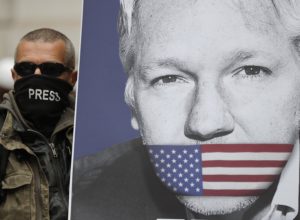
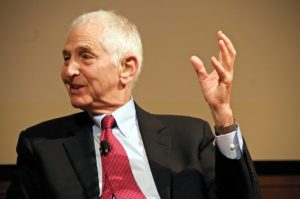
You need to be a supporter to comment.
There are currently no responses to this article.
Be the first to respond.